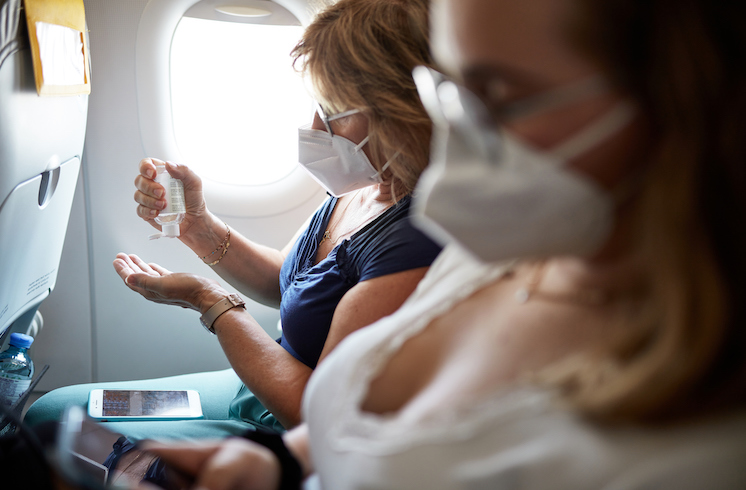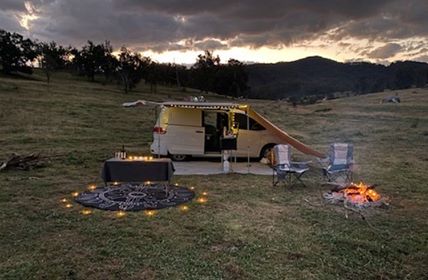Is It Ethical to Travel in a Pandemic?
Lockdowns and restrictions have affected everyone, and many of us are desperate to be reunited with loved ones, or to just hit the road. But what should we consider when we travel during COVID-19?
 Photo © Getty Images/Devon Strong
Photo © Getty Images/Devon Strong
If you’ve been separated from loved ones or just miss the joys of travel, you‘re no doubt itching to break out your passport and hit the road again. Before you decide where to go and what to do when you get there, put on your global citizen hat and go forth with an ethical mindset. The travel decisions you make now can have a lasting impact on the communities you visit, and your fellow travelers.
- Careful reunions
- Where to go
- Vaccines and variants
- Getting there and around
- Am I welcome?
- How can I travel more ethically?
Careful reunions
Before the pandemic closed borders and grounded planes, moving to another country for work, love or adventure had become commonplace – more than 50 million ex-pats lived permanently abroad in more than 160 countries. While the pandemic motivated many to return home, it’s been a long time between visits for those who didn’t or couldn’t get back. With vaccination rates increasing and travel becoming possible again, those ex-pats can now entertain the idea of seeing their loved ones not just on a screen, but face to face. For travel writer Ivy Carruth, an American ex-pat living in Sydney, Australia, it has been distressing not to be able to visit her parents, both aged in their 70s and largely housebound in their Atlanta home as COVID-19 cases escalated around them.
“They’ve both had the vaccine now and I’ve had my first dose, so I hope that once I receive my second, it won’t be long before borders open up,” Carruth says. “As soon as I’m able, I’ll go.” Although she’ll be fully vaccinated, Carruth says she will be taking extra precautions when she travels from now on: “Washing hands, social distancing, masking everywhere and avoiding crowds.”
Where to go
Reunions aside, the idea of taking to the skies for foreign lands is a tempting one, especially while popular cities and travel hotspots are blissfully free of crowds. When considering where to go, however, ethical travelers will take a ‘we-not-me’ approach and weigh up how ready a destination is to receive travelers. Consider the current vaccination rates in the country you want to visit, whether vaccines are accessible (and affordable) to everyone, and how much risk you’ll pose to local communities just by being there.
Locals aside, if you or someone in your group gets sick and needs hospital care, will you be placing an additional burden on an already strained healthcare system? If the pandemic isn’t well under control where you’re headed, will the care you need even be accessible? Thorough research and forward planning are vital when you set off in our pandemic-weary world – preparing for every contingency will give you the peace of mind you need to travel with confidence.
Vaccines and variants
Vaccination rates are on the rise but it’s still unclear whether vaccinated people can spread the virus and, if so, how easily. Vanderbilt University Medical Center Staff Scientist Sanjay Mishra says preliminary studies indicate that those who get sick with COVID-19 after vaccination experience milder symptoms and are likely to be less infectious. “But without more studies, scientists cannot yet conclude that COVID-19 vaccines really do protect against all transmission,” Mishra says.
Remember that some people are unable to be vaccinated because of their age or health conditions, at home and abroad. This doesn’t mean you shouldn’t travel, but that you should do what you can to protect everyone you encounter by wearing a mask, social distancing and sanitizing your hands – even if you’re fully vaccinated and vaccination rates are on the rise in the country to which you’re traveling.
This is even more important if someone with whom you’re traveling hasn’t had the jab. Unvaccinated children, for example, may have COVID-19 but not be showing any symptoms. “COVID-19 poses a particular challenge because people with asymptomatic and pre-symptomatic infections can spread the disease,” Mishra says. “Some scientists estimate that the number of asymptomatic COVID-19 infections in the overall population could be 3 to 20 times higher than the number of confirmed cases.”
Intrepid Travel co-founder Geoff Manchester agrees, saying that although vaccines can prevent you from getting sick, they don’t necessarily stop you from becoming infected or spreading an illness around. “Preliminary evidence seems to suggest the COVID-19 vaccines make it less likely someone who’s vaccinated will transmit the coronavirus, but the proof is not yet ironclad,” Manchester says. “Unvaccinated people should still be diligent about mask-wearing, physical distancing, and other precautions against the coronavirus.”

Getting there and around
As we emerge from the pandemic, some more battered and bruised than others, what we have in common is a newfound appreciation for travel and a desire to do things better this time – the impact tourism has had on the world has been laid bare.
Airlines are falling over themselves to convince travelers it’s safe to fly, but now is the time to begin as we mean to go on and fly with the environment in mind. Choose airlines with environmentally friendly fleets (Boeing 787 Dreamliners and Airbus A350s are among the most fuel-efficient) and that have actively worked to reduce single-use plastics on board. Make up for your flight’s emissions with carbon offsets, and fly direct if you can.
UK-based Sue-Anne Mayne, founder of homestay start-up SisterStay, says the worldwide travel restrictions we’ve endured over the past year have given us the time-out we needed to consider what’s important in life and how we wish to travel in the future.
“Is it really sustainable to have flights so cheap that we can all afford to nick off to a different European destination every weekend?” Mayne asks. “My vision for the future is to have everyone travel more slowly and thoughtfully – and perhaps less often – staying longer in each destination, getting a feel for the local rhythm of life and contributing to the local economy in a sustainable way.”
Mayne started SisterStay because she felt there was a need for a genuine homestay community. “A trip anywhere is always so much more meaningful when we make connections with real people while we’re there,” she says. “I believe most people will naturally carry an awareness of how serious the pandemic has been, but I would love to encourage all travelers to stay up to date with government guidelines, to be sensible in the situations and spaces they go into and, of course, to be kind and mindful towards people they encounter who may still be feeling some anxiety about the virus.”
Am I welcome?
It’s easy to assume you’ll be greeted with open arms when you land in a tourism-reliant destination, but a pandemic flipside has allowed locals to enjoy their own cities without crowds of visitors. If we all flock back to the same over touristed areas, not only will we be putting the same strain on communities and ecosystems as in the past, but it may also be difficult to keep a safe distance from others.
Encouragingly, the pandemic is motivating many travelers to explore lesser-known destinations in low-impact ways and to opt for small-group travel experiences that embrace nature. Travel companies are responding to demand with carbon-neutral itineraries, off-the-beaten-path routes, and local partnerships that help communities recover and give travelers the authentic travel experiences they’ve been craving.
How can I travel more ethically?
Choose an ethical tour operator, minimize your travel footprint, and do what you can to make sure the travelers following in your footsteps have an experience as enriching as yours. How? Travel with kindness to ensure locals give future travelers a warm welcome and accept that your travel experience may be a little different to your travels of the past. Not everything may be open, not every local may appreciate your presence, and the COVID-19 precautions a country has in place may be different – and cause more inconvenience – to what you’re used to.
Respect their approach, follow government guidelines, and be prepared for border closures and restrictions to change your plans without warning. Being flexible and adapting without a fuss is the mark of a truly global citizen.
Related articles
Simple and flexible travel insurance
You can buy at home or while traveling, and claim online from anywhere in the world. With 150+ adventure activities covered and 24/7 emergency assistance.
Get a quote

No Comments